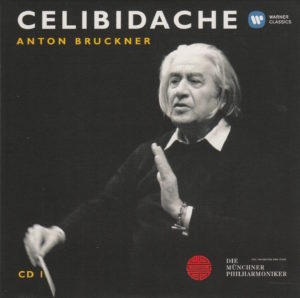
My “office’ this morning is home. I’ve positioned my desk to face out on the small lake behind our place. It’s a blustery March day, which signals a change in the weather. In this case, the temperature is dropping.
But it’s a pretty view nonetheless.
 This morning, I’m listening to Bruckner’s Symphony No. 3 in D Minor WAB 103 (nicknamed “Wagner Symphony”), interpreted by the Romanian conductor Sergiu Celibidache (1912-1996).
This morning, I’m listening to Bruckner’s Symphony No. 3 in D Minor WAB 103 (nicknamed “Wagner Symphony”), interpreted by the Romanian conductor Sergiu Celibidache (1912-1996).
According to one web site, his name is pronounced: SER-zhoo Chay-lee-bee-DAH-ke.
I’ll have to take their word for it.
[NOTE: You may be wondering why I’m just now listening to Celibidache, and why I’m listening to him and not Inbal, who usually follows Barenboim in this leg of my journey. The reason is because the Celibidache box set omits the first two symphonies and picks up on the third. So, from now on, I’ll be adding Celibidache to my cycle, following Barenboim every time to the end.]
I’m ashamed to admit that I had never heard of Maestro Celibidache until just recently.
If I recall correctly, a member of the Bruckner group on Facebook suggested I listen to him.
So I am.
But there’s more to this guy than just listening.
The more I read about him, the more I’m fascinated by him.
According to his entry on Wikipedia, Celibidache,
was a Romanian conductor, composer, and teacher. Educated in his native Romania, and later in Paris and Berlin, Celibidache’s career in music spanned over five decades, including tenures as principal conductor for the Munich Philharmonic, Berlin Philharmonic, Sicilian Symphony Orchestra and several European orchestras. Later in life, he taught at Mainz University in Germany and the Curtis Institute of Music in Philadelphia, Pennsylvania.
Celibidache frequently refused to release his performances on commercial recordings during his lifetime, claiming that a listener could not obtain a “transcendental experience” outside of the concert hall. Many of the recordings of his performances were released posthumously. Nonetheless, he earned international acclaim for celebrated interpretations of the classical music repertoire and was known for a spirited performance style informed by his study and experiences in Zen Buddhism. His later career was marred by controversy and accusations of sexism and discrimination that came to light during a 12-year legal battle that dominated his tenure at the Munich Philharmonic.
Of particular interest to me is the entry on Wikipedia under Legacy:
Performance style and criticism
Celibidache’s approach to music-making is often described more by what he did not do instead of what he did. For example, much has been made of Celibidache’s “refusal” to make recordings even though almost all of his concert activity actually was recorded with many released posthumously by major labels such as EMI and Deutsche Grammophon with the consent of his family. Nevertheless, Celibidache paid little attention to making these recordings, which he viewed merely as by-products of his orchestral concerts.
Celibidache’s focus was instead on creating, during each concert, the optimal conditions for what he called a “transcendent experience”. Aspects of Zen Buddhism, such as ichi-go ichi-e, strongly influenced his thinking. He believed that transcendental experiences were extremely unlikely to ensue when listening to recorded music, so he eschewed them. As a result, some of his concerts did provide audiences with exceptional and sometimes life-altering experiences, including, for example, a 1984 concert in Carnegie Hall by the Orchestra of the Curtis Institute that New York Times critic John Rockwell touted as the best of his 25 years of concert-going.
Celibidache was well known for his demands for extensive rehearsal time with orchestras. An oft-mentioned feature of many of his concerts, captured in the live recordings of them, is a slower tempo than what is considered the norm, while, in fast passages, his tempos often exceeded expectations. In Celibidache’s own view, however, criticism of a recording’s tempo is irrelevant, as it is not (and cannot be) a critique of the performance but rather of a transcription of it, without the ambience of the moment, for him, a key factor in any musical performance. As Celibidache explained, the acoustic space in which one hears a concert directly affects the likelihood of the emergence of his sought-after transcendent experience. The acoustic space within which one hears a recording of one of his performances, on the other hand, has no impact on the performance, as it is impossible for the acoustic features of that space to stimulate musicians to play slower or faster.
That his recorded performances differ so widely from the majority of other recordings has led them to be seen by some as collectors’ items rather than mainstream releases, ‘one-offs’ rather than reference recordings.
The Japanese term bears quoting here.
According to its entry on Wikipedia,
Ichi-go ichi-e (一期一会 “one time, one meeting”) is a Japanese four-character idiom (yojijukugo) that describes a cultural concept of treasuring meetings with people. The term is often translated as “for this time only,” “never again,” or “one chance in a lifetime.” The term reminds people to cherish any gathering that they may take part in, citing the fact that many meetings in life are not repeated. Even when the same group of people can get together again, a particular gathering will never be replicated and thus, each moment is always once-in-a-lifetime. The concept is most commonly associated with Japanese tea ceremonies, especially tea masters Sen no Rikyū and Ii Naosuke.
All of this intrigues me on many levels.
First, I’m a student of Zen myself. So I understand its unique quirks.
Even the back of the booklet of liner notes intrigues me. It reads:

SYMBOL FOR LONGEVITY
Sergiu Celibidache’s view of life and music was markedly influenced by Zen.
A Japanese Zen master once described Celibidache’s conducting as
‘free music through free hands’.
Shou is a Chinese symbol for longevity. Zen Buddhism was founded in China
in the 6th century A.D., and its modern practice in Japan is based on schools
established there in the 12th and 13th centuries
For this edition, the shou has been chosen to symbolise Celibidache’s ongoing
musical and spiritual legacy.
Is that cool, or what?
Second, the kind of performance Celibidache might have something in common with avante-gard composer John Cage (also a proponent of Zen) in that he considers each performance unique.
His orchestra is the Munchner Philharmoniker (Munich Philharmonic), which – according its entry on Wikipiedia – is,
a German symphony orchestra located in the city of Munich. It is one of Munich’s four principal orchestras, along with the Bavarian Radio Symphony Orchestra, the Munich Radio Orchestra and the Bavarian State Orchestra. Since 1985, the orchestra has been housed in the Gasteig Culture Centre.
The orchestra was founded in Munich in 1893 by Franz Kaim, son of a piano manufacturer, as the Kaim Orchestra. In 1895, it took up residence in the city’s Tonhalle (concert hall). It soon attracted distinguished conductors: Gustav Mahler first directed the group in 1897 and premiered his Symphony No. 4 and Symphony No. 8 with the orchestra, while Bruno Walter directed the orchestra for the posthumous premiere of Mahler’s Das Lied von der Erde. Felix Weingartner was music director from 1898 to 1905, and the young Wilhelm Furtwängler made his auspicious conducting debut there in 1906. Meanwhile, Anton Bruckner pupil Ferdinand Löwe established an enduring tradition of Bruckner performance which continues to this day.
Throughout this time the orchestra, which by 1910 was known as the Munich Konzertverein Orchestra, was privately funded, but during World War I finances became tight and players were called for military service, forcing the orchestra to cease operation. After the war, the orchestra was taken over by the city of Munich and restarted under the leadership of composer Hans Pfitzner, soon replaced by Bruckner pioneer Siegmund von Hausegger. In 1928, the orchestra acquired its current name.
After the rise of the Nazi party in 1933, the orchestra stamped its scores with swastikas and the words “The Orchestra of the Fascist Movement”. (The swastikas weren’t removed until the early 1990s.) In 1938, the pro-Nazi conductor Oswald Kabasta became chief conductor, raising its musical standards even as World War II began.
The record label is Warner Classics, which was awarded “Label of the Year” at the 2016 Gramophone Awards in London last October.
From the fascinating (if too-brief) liner notes written by Eckhardt Van Den Hoogen,
He [Celibidache] was said to be difficult, a non-conformist, one ‘whose radicality was polarizing…creating either respect and admiration or mistrust and rejection’, a man who caused distress and wore people down, and who issued a legendary, strict repudiation of any form of recording.
[Celibidache’s thoughts on tempo] This capaity for sponge-like absorption by no means interfered with his ability to learn: ‘Herr Doctor, how fast does that go?’ he once asked Wilhelm Furtwangler about a particular passage. The answer had unexpected consequences: ‘Ah that depends on how it sounds.’ Later Celibidache alluded to this laconic remark: ‘So, the way it sounds can determine the tempo! Tempo isn’t a reality per se, but a condition. If there are an enormous variety of factors working together, then I need more time in order to create something musical; if less is going on, I can move through more quickly.’
Wow.
So this CD box set (even though it lacks Symphonies No. 1 and No. 2) is poised for big things.
At least, my expectations are big.
Let’s see if the performance lives up to the hype I’ve created for myself.
You know how this works. First, the objective stuff.
Then, my opinion of the performance and box set and liner notes, etc.
The facts:
Bruckner’s Symphony No. 3 in D Minor WAB 103, composed 1873
Sergiu Celibidacheconducts
Celibidache used the “1888/89 ed. Nowak,” according to the liner notes
Munchner Philharmoniker (Munich Philharmonic) plays
The symphony clocks in at 65:31 (minus the 1:10 applause on track 5)
This was recorded in Munich, Germany, on March 19 & 20, 1987
Celibidache was 75 when he conducted it
Bruckner was 49 when he finished composing it (the first time)
This recording was released on the Warner Classics label
Bruckner wrote his symphonies in four movements. The time breakdown of this one (Symphony No. 3 in D Minor), from this particular conductor (Celibidache) and this particular orchestra (Munchner Philharmoniker) is as follows:
I. Gemäßigt, mehr bewegt, misterioso (Moderate, more animated, mysterious)……………………………………………………………………………………………………25:07
II. Adagio. Bewegt, quasi Andante (With motion, as if Andante)………………………………………………………………………………………………………..16:38
III. Scherzo. Ziemlich schnell (Fairly fast) (also Sehr schnell)……………………………………………………………………………………………………………..7:46
IV. Finale. Allegro (also Ziemlich schnell)………………………………………………………15:04
Total running time: 65:31
The opinions:
My Rating:
Recording quality: 4
Overall musicianship: 5
CD liner notes: 4 (thin booklet mostly about Celibidache, with a wee bit about Bruckner, translated into English, German, and French – fascinating for me, but unfulfilling as a primer on Bruckner’s symphonies)
How does this make me feel: 5
It’s going to be impossible for me to separate the conductor from the music today. I’ve read so much about Celibidache and his thoughts on Zen and tempo and his legendary quirks that all of that infuses the music with a spirit of its own.
I’ll give it a try, though.
The word that comes to mind listening to the first two movements is “sweeping.” These pieces of music have an ethereal quality to them that seems to take me away, usher me into another realm.
The word that comes to mind when listening to the last two movements is “spiritual.”
The Scherzo is blistering, as Bruckner’s Scherzos almost always are.
But it’s the Finale that, I think, steals the show. It’s beautiful. Lyrical. Triumphant.
Okay.
Now I know music is 100% subjective.
Because, thanks to what I’ve read about Celibidache, I’m hearing a depth, a spirituality, a grasp of music and music listeners that transcends what his orchestra is playing and what he’s conducting.
I could recommend this performance with a hearty “Huzzah!” but I wonder if someone else would hear in it what I do?
